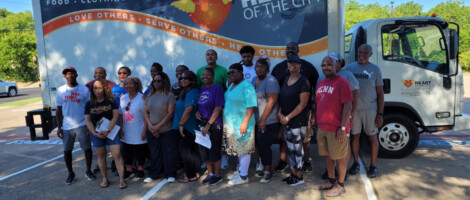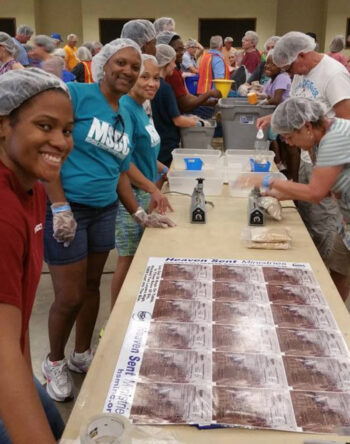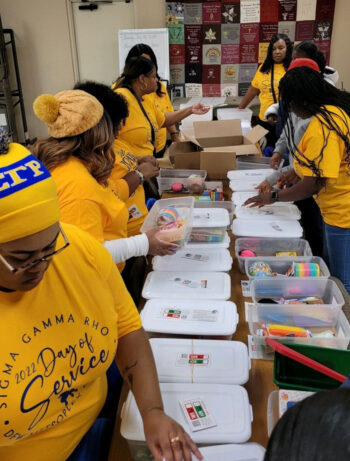Morse Street Baptist uses Pave strategies to bring unity and serve Denton’s homeless community
by Jessica King on May 5, 2025 in Stories of Impact

Morse Street members serving with Heart of the City, giving out food to the community.
“Everybody wants to be a Great Commission church, but it was about what did the Great Commission look like at our church?” said Larry Willis, pastor at Morse Street Baptist Church.
Prior to stepping into the Pave process, Morse Street Youth Pastor and Minister of Music Bobby Hicks, noticed that “there was a sense of decrease in evangelism” and the church’s discipleship strategy needed some fine-tuning.
Also serving as the Church Health Strategist at Texas Baptists, Hicks considered Pave’s mission to “get every church to come back 100% to the Great Commission” and introduced Willis to the ministry. He became Willis’ coach through the Pave process.
“To coach him was a blessing for me,” said Hicks. “Being a staff member, while at the same time being a representative for Texas Baptists, it was humbling for me to know that a pastor would take off, in a sense, the hierarchy hat and actually sit to learn from a staff member.”
Pave is Texas Baptists’ church revitalization strategy designed to help pastors customize revitalization for their context by equipping them with resources and placing them in cohorts to be trained by a coach and encouraged within a community of pastors.
“I like how they have the name ‘Pave’ because there was actually a path that we could follow to get the better results that we are looking for in terms of trying to be a Great Commission church,” said Willis.
Morse Street youth “bring a freshness” to Sunday worship
After interviewing their church leaders, Willis and Hicks discovered that their church “needed to grow younger.” They decided to apply the Pave principle “display the church you need to become.”
“We realized that our church was not growing younger, which is not good for the church because [young people are] the future of the church,” said Hicks.
Hicks said Morse Street previously held “Youth Sundays” but he “felt in my own conviction” that that was “sending a message to our young people that they can only serve on a second Sunday in the sanctuary.”

Morse Street members working together to serve Denton County.
“I said ‘Well why can't we do that every Sunday?’” explained Hicks. “Youth are more committed to serving something that they feel that they are a part of.”
The church began integrating their youth in Sunday worship services. Students have stepped up in various roles, including reading a passage of scripture to open the service, leading the church in prayer to close, running the livestream, serving as ushers and several have joined adults to sing in the choir.
Willis said doing this to grow the church was “low-hanging fruit” because it was “something that we could really do immediately.” Willis has since noticed that they’ve discovered God can use them and “want to know more about evangelism.”
“[I’ve seen that the students] feel like they have a call in their life, that they can reach their friends for Christ. So, one of the things that I see that they're doing is they're inviting their friends to come to church with them,” said Willis.
Hicks said this displays “a mix of generations throughout the whole service” and has encouraged the youth to “take ownership of serving in ministry now that it's not just something that the adults do.”
“From here on, we want a family of all ages to walk into the sanctuary and see themselves somewhere,” said Hicks. “So, an adult, we want them to see themselves; teenagers, we want them to see themselves; same thing with children. So through that, our kids now take ownership of ministry.”
Willis said this shift in Sunday service has inspired the congregation to “be more consistent” in attendance and service.
“One of [our members] told me, he said, ‘I'm looking at a little kid doing something like that, and I need to get busy in serving the Lord,’” explained Willis. “I think the kids kind of bring a freshness, if you will, in the worship service.”
Morse Street has also implemented a Pave strategy called the Three-Week Baptism Plan, which teaches churches to celebrate baptisms. Hicks said this goes hand-in-hand with displaying the church you want to become.
“Baptism is the very perception [of] see[ing] evangelism at work,” said Hicks. “If we want to encourage people to be more evangelistic, then we should celebrate those things that are evangelistic.”
Hicks said since integrating youth into Sunday services, baptisms of young people in the church have also increased.
He said implementing these Pave strategies has allowed the church to build momentum in ministry.
“We have a new vision, new mission. All of our leaders are in line with where we're going and what we're doing,” said Hicks. “We're all on the same page, and our baptisms have grown and our ministry participation has grown because of Pave.”
Sharing the gospel by meeting a need
Another part of the Pave process is the demographic study, which helps pastors “find the needs of the community” and “serve that need.” Willis and Hicks conducted a demographic study of the Denton area and learned that “homelessness is growing in that specific area.”
In response, they created a ministry feeding the homeless called “Compassion in Action.” Every second and fourth Sunday, Morse Street partners with Heart of the City, a Denton County charity that provides free food, clothing, counseling and more, to give out food to the community.
“[Heart of the City] brings in a truckload of food and all kinds of canned food and meats and so forth, and we send it out on Facebook to let people know that we know we are open on that Saturday morning from 8:30 to 10:30,” explained Willis. “The whole purpose is to build relationships and share the gospel, and we've been doing that for about seven months now. It is really doing well.”
In step with the demographic study, Willis conducted seven interviews with community leaders as a part of the Pave process. He asked two questions– “What are the dark things in the community that you know that we need to know that's going on?” and “How could we help?” – to get an idea of where his church could serve in the community.
“We want to make a difference in our community, [so I] asked them what areas they thought that we could help. That was very insightful, to find out the different things, and it helped us to choose where we felt like God wanted us to serve in our community,” said Willis.

Morse Street members pack supply boxes to provide for the community.
God led Morse Street to serve the homeless community in Denton with an additional ministry effort called “Food and Fellowship.”
One Sunday per month, the city sponsors a time for the church to prepare a meal and share it with the homeless community, which gives church members “an opportunity to pray with them and to share the gospel with them.”
Willis said once the church van is repaired, they will pick up people for Sunday worship services.
He said Morse Street’s two feed the homeless ministries have “brought a lot of unity” to the congregation, and they’ve seen people they serve with the ministries join the church.
“When I presented the mission and the vision, it’s like they could see it and it looked like it was possible, and it had us all going in the same direction,” said Willis. “Pave helped us to go down that same path and try to understand who we are as the church and what we felt like God was calling all of us to do as a local church… We love that we actually meet the people and talk with them, and actually, we get people coming to our church, in our community now.”
Hicks said “Food and Fellowship” and “Compassion in Action” also stirred a heart for evangelism within the church.
“We don't have any evangelism team. The whole church is the evangelism team,” said Hicks.
Pave provides vision and unity
Hicks said it was humbling to coach his own pastor through Pave.
“It was humbling for me to know that a pastor would take off, in a sense, the hierarchy hat and actually sit to learn from a staff member,” said Hicks. “I think that the reason why that worked so well is because he's a very humble man and he puts the mission [as] more important than positions.”
Willis said pastors considering Pave “won’t regret it” as it will provide a clarified vision for the church.
“It's hard work [but] it's worth it. I think [pastors] will see the dividends early in the process because it begins with us. It's going to help the pastor to really have a vision with a process that he can step the church through to where they can see the beginning and they can see the end result,” said Willis.
“When you start on a project like this and you are really serious about being a Great Commission church, you should anticipate the enemy will attack,” said Willis. “So, one of the things that we did is we made sure that the church [knew] we had to be in prayer about this.”
Strengthening a multiplying movement of churches to live out the Great Commandment and Great Commission in Texas and beyond.
The ministry of Texas Baptists is made possible by giving through the Texas Baptists Cooperative Program, Mary Hill Davis Offering® for Texas Missions, Texas Baptists Worldwide and Texas Baptist Missions Foundation. Thank you for your faithful and generous support.
Subscribe to receive stories like this one directly to your inbox.
We are more together.
Read more articles in: Stories of Impact, Pave, Church Health
More from Jessica King
- Millennial/Gen Z Network is "revolutionary," provides resources, community, refreshment for young ministry leaders
- Children’s Worship University trains leaders to “raise disciples in the area of worship”
- Corpus Christi church plant hosts annual retreat, meets medical needs for Ghanaian children with disabilities
- 98 BSM and church collegiate leaders form 2026 State Lead Team, develop skills to “change the culture” of ministry
- Behind The Chutes Cowboy Church shares resources, plants seeds of the gospel at Amarillo Fair & Rodeo